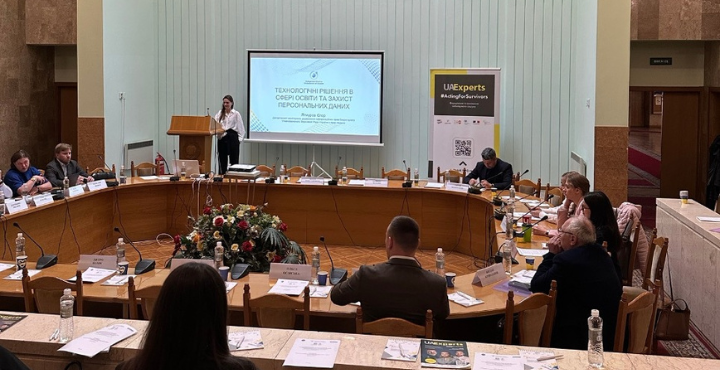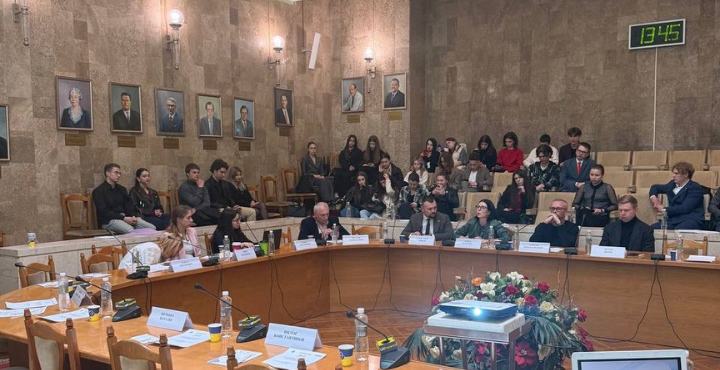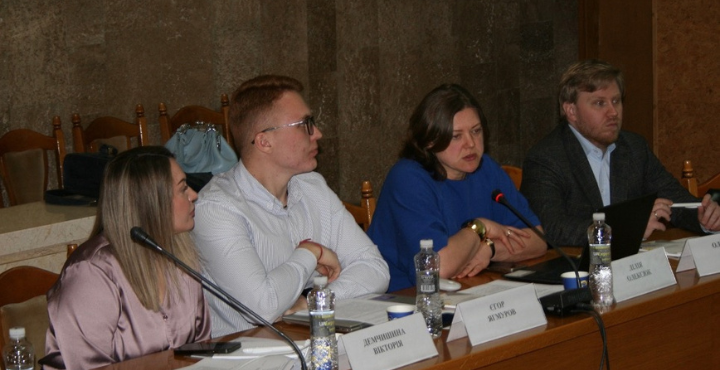Round Table “Artificial Intelligence and Technological Literacy in the Field of Education in Ukraine”

On May 7, 2025, the round table “Artificial Intelligence and Technological Literacy in the Field of Education in Ukraine” was held at the Educational and Scientific Institute of International Relations of Taras Shevchenko National University of Kyiv. The event brought together key stakeholders from the educational, governmental, and private sectors and served as a vital platform for public discussion on the digital transformation of Ukrainian education. The organizers were the National Committee of Ukraine for the UNESCO Information for All Programme (IFAP), the Secretariat of the Ukrainian Parliament Commissioner for Human Rights, the NGO UA Experts, and the Institute of International Relations.

Welcome remarks were delivered by:
Olha Shpakovych, Doctor of Law, Professor at the Department of Comparative and European Law, Institute of International Relations;
Iryna Krasovska, Head of the Expert Group on the Development of Science-Intensive Innovations, Directorate of the Ministry of Education and Science of Ukraine;
Serhii Nizhynskyi, PhD in Law, Head of the NGO "UA Experts".
The first panel discussion, “Technological Solutions in the Field of Education and the Protection of Personal Data,” addressed the risks of digitalization without adequate legal regulation.
Liliia Oleksiuk, member of the National Committee of Ukraine for the UNESCO Information for All Programme (IFAP) and advisor to the Parliamentary Committee on National Security, Defense, and Intelligence, emphasized the need for caution in implementing new technologies in education and underscored the primacy of human rights, including the rights to privacy, access to information, and non-discrimination.
Oleksandr Shevchuk, PhD in Law, Assistant professor at the Department of International Law, Institute of International Relations, and member of IFAP, drew attention to regulatory gaps in the field of personal data protection in education and called for the incorporation of international standards into domestic practice.
Yehor Yahmurov, Chief Specialist at the Secretariat of the Ukrainian Parliament Commissioner for Human Rights, focused on specific violations of informational rights within the educational process and the need for adequate state monitoring of digital services.

The second panel discussion, “Artificial Intelligence and Web3 in the Educational Sphere in Ukraine,”addressed the potential and the risks associated with emerging digital technologies.
Mariia Krasnoshchok, Expert at the Directorate of Innovation and Science Liaison of the Ministry of Education and Science of Ukraine, presented the key provisions of the new recommendations on using AI in education, emphasizing transparency, fairness, and non-discrimination.
Petro Bilyk, Partner at the law firm Juscutum, outlined business expectations for legal professionals working with AI, stressing the need for deep technological understanding, adaptability, and the ability to support innovative solutions.
Olha Osynska, PhD in Law, Project Lead at the Ministry of Digital Transformation’s Sandbox Initiative, outlined the possibilities of using digital technologies in education, including blockchain-based solutions, automated educational services, and digital identity systems.
Oleksandr Pyzhov, PhD in Law, Expert at the Council of Europe on education policy and human rights, and Acting Rector of the National University of Physical Education and Sport of Ukraine, firmly advocated for integrating innovation in education while stressing the importance of preserving its humanistic essence.
Bohdan Kryvolapov, PhD in Law, Associate Professor at the Department of Private International Law, Institute of International Relations, presented a comparative overview of global approaches to implementing AI in education, focusing on legal regulation.
Dmytro Nikolaievskyi, Chief Legal Officer of the Project Office of the Ministry of Digital Transformation of Ukraine, emphasized the need to establish a legislative framework that would allow the harmonization of digital technology development with the needs of the education sector.
Viktoriia Khomenko, PhD in Law, Assistant professor at the Department of Private International Law, Institute of International Relations of Taras Shevchenko National University of Kyiv, and member of the National Committee of Ukraine for the UNESCO Information for All Programme (IFAP), moderated both panels.
The event demonstrated that successful digital transformation is possible only through dialogue among key stakeholders—educators, public authorities, and business representatives. Such cross-sectoral exchange allows for the identification of shared challenges and helps generate balanced, human rights–based, innovative, and responsible solutions.